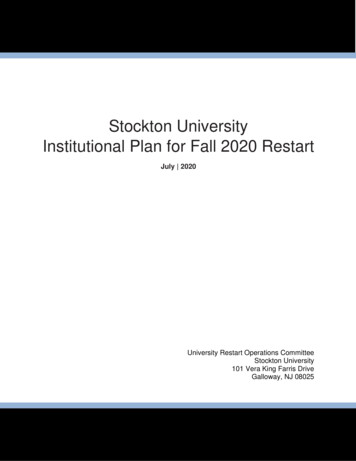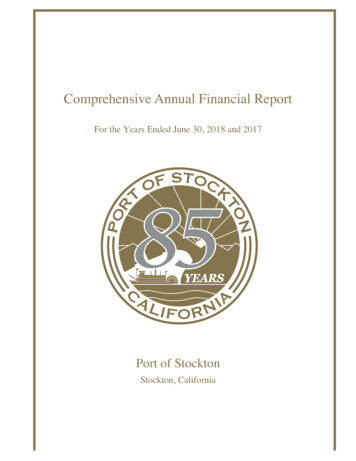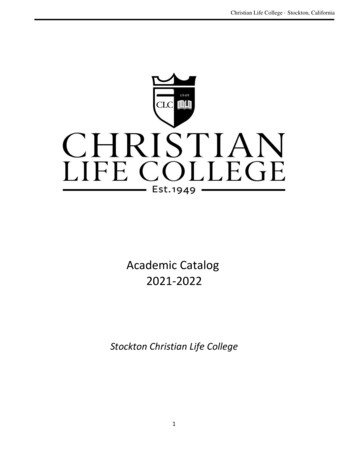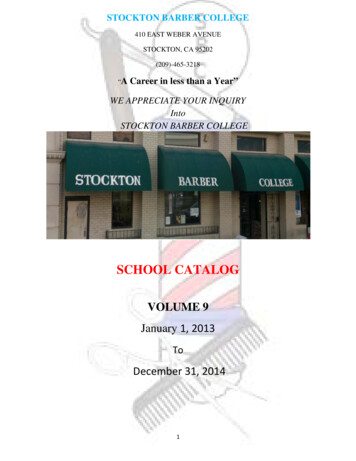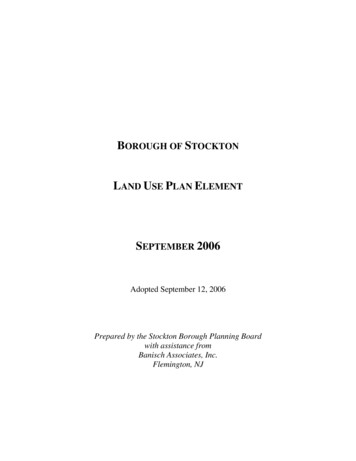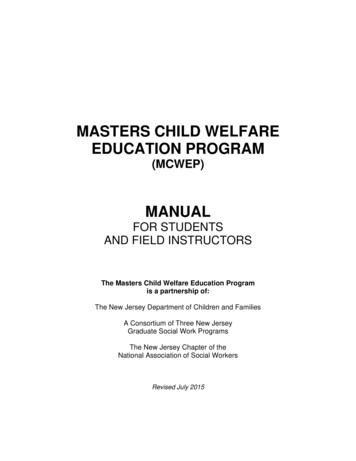
Transcription
MASTERS CHILD WELFAREEDUCATION PROGRAM(MCWEP)MANUALFOR STUDENTSAND FIELD INSTRUCTORSThe Masters Child Welfare Education Programis a partnership of:The New Jersey Department of Children and FamiliesA Consortium of Three New JerseyGraduate Social Work ProgramsThe New Jersey Chapter of theNational Association of Social WorkersRevised July 2015
MCWEP Consortium MembersMonmouth University School of Social Work, MSW ProgramRutgers, The State University, School of Social Work, MSW ProgramStockton University, MSW Program (Lead Institution)Revised 7‐16‐2015Page 2
ContentsI. Introduction to Program . 4A. Purpose of the Masters Child Welfare Education Program (MCWEP) . 4B. Program Structure . 5C. Program Benefits . 61. For MCWEP students . 62. For MCWEP Field Instructors . 63. For the New Jersey Department of Children and Families . 6D. Practice Approaches Taught in Masters Child Welfare Education Programs . 7E. New Jersey Department of Children and Families Case Practice. 8F. Masters Child Welfare Education Program Staff and Contact Information . 8II. Program Description . 9A. Traineeship Selection Process . 9B. Educational Leave Request Process. 9C. Agreements . 91. Student Agreement with Lead Institution (Stockton University) . 92. Field Instructor Agreement . 10D. MCWEP Student Competencies and Practice Behaviors . 11E. Limitations on Intern Activities . 13F. Evaluation of Student Interns . 14G. Criteria for Termination of Traineeship . 14APPENDIX A: Monmouth University Competencies and Practice Behaviors . 15APPENDIX B: Rutgers University Competencies and Practice Behaviors . 20APPENDIX C: Stockton University Competencies and Practice Behaviors . 24Revised 7‐16‐2015Page 3
I. Introduction to ProgramA. Purpose of the Masters Child Welfare Education Program (MCWEP)The intent of MCWEP is to enhance the knowledge and skills of supervisors who are currently employed at the Divisionof Child Protection and Permanency (DCP&P), through completion of a Master’s Degree in Social Work (MSW). Throughparticipation in MCWEP, DCP&P supervisors will broaden their perspectives on social work and child welfare (includingevidence‐based public child welfare practice), develop advanced clinical skills, and deepen their supervisory skills so thatthey become more confident supervisors and mentors in the work with at‐risk children and families and more effectiveleaders in the continuing transformation of New Jersey’s public child welfare system. Specifically, MCWEP:1.Provides opportunities for supervisors, in particular casework supervisors, currently employed at the Division ofChild Protection and Permanency to obtain graduate‐level social work education at one of the participating part‐time MSW programs without disrupting their careers.2.Provides opportunities for participants to enroll in an MSW program that is focused on building competencies ingeneralist social work and clinical, direct practice, while taking two electives that very directly relate to issues thatDCP&P supervisors face daily (the trauma that children and families experience and the challenges of leadershipand supervision in child welfare).3.Strengthens systemic linkages among the three divisions of the Department of Children and Families (ChildProtection and Permanency, Children’s System of Care, Family and Community Partnerships) by giving DCP&Psupervisors the opportunity to do their fieldwork directly in Children’s System of Care, Family and CommunityPartnerships, or in agencies contracted by DCF, bringing back into DCP&P a clearer understanding of the functioningof these agencies and the potential benefits of their work for New Jersey’s children and families.4.Enhances the skills of agency‐based field instructors in working with graduate social work students who haveimportant responsibilities in the Division of Child Protection and Permanency, as well as enhances field instructor’sknowledge of DCP&P.5.Contributes to the knowledge base about best practices in educating child welfare supervisors.6.Partners with the New Jersey Department of Children and Families in building a transformed child welfare systemwith a more professionally educated staff that produces better outcomes for New Jersey children and their families.Revised 7‐16‐2015Page 4
B. Program StructureMCWEP is a partnership among the Division of Children and Families, The National Association of Social Workers, and aconsortium of three graduate social work programs—the Monmouth University School of Social Work MSW Program, theRutgers University School of Social Work MSW Program, and Stockton University MSW Program. Stockton University servesas the Lead Institution, coordinating and developing the overall MCWEP program. The elements of MCWEP are:A. A part‐time MSW program, either traditional (60‐credits) or advanced standing (30‐36 credits), focusing on clinical,direct social work practiceB. A Learning CommunityC. Two specialized elective courses (Leadership and Supervision in Child Welfare and Trauma‐Informed Child WelfarePractice)D. Program evaluationEach MSW program shares a common foundation curriculum; but each program’s advanced curriculum has a somewhatdifferent focus, although all programs have an advanced clinical/direct service social work concentration available. MCWEPstudents enroll in this clinical concentration for their advanced studies, assuring that the DCP&P supervisors who completeMCWEP will have clinical skills in addition to leadership and supervisory skills.The Learning Community is an integral component of MCWEP designed to enhance students’ MSW classroom and fieldlearning experiences and meaningfully connect these experiences to child welfare practice and supervision. The purpose ofthe MCWEP Learning Community is to foster a state‐wide network of MCWEP participants, to disseminate educationalinformation related to child welfare, and to encourage dialogue among participants regarding MSW education andtranslation of educational outcomes to workforce experiences. The Learning Community also provides an avenue for processevaluation of the needs of student participants in MCWEP.The Learning Community has two components in which MCWEP participants are expected to be involved. In the bi‐weeklyonline discussion board, students are expected to respond to discussion threads posted twice per month via an onlineeducational discussion site. The second component involves quarterly in‐person meetings where students haveopportunities to gain further education, disseminate information in group presentation format, and engage in processevaluation.The two elective courses are designed to help students develop an in‐depth clinical understanding of the children andfamilies served by DCP&P and to enhance their skills as leaders and supervisors.Program evaluation is an essential part of every program. MCWEP will develop surveys for assessing whether it is meeting itsobjectives and will regularly administer these instruments to participants and report the results to DCF, participating MSWprograms, and the professional community as appropriate.Revised 7‐16‐2015Page 5
C. Program Benefits1. For MCWEP studentsa.They have an opportunity to participate in a part‐time MSW program that is focused on meeting theirunique needs as supervisors in the Division of Child Protection and Permanency while also giving them afoundation in generalist social work and an advanced concentration in clinical social work practice.b.Their graduate tuition and fees are paid in full.c.They are able to maintain their full‐time employment and receive release time to enable them to completetheir studies and field work.d.They have access to field instructors who are receiving training and support in offering competency‐basedfield instruction.e.They have an opportunity to become more effective leaders in building a transformed child welfare systemand in creating better outcomes for New Jersey children and their families.2. For MCWEP Field InstructorsFor social workers, providing field instruction to a student is an opportunity to “give back” to their profession—togive to another what was given to them when they were students. Field instruction also provides workers with anopportunity to experience themselves as educators as well as workers. Responding to students’ questions andreactions to the work can be challenging and rewarding. MCWEP also provides field instructors the opportunity tolearn more about the work of the Division of Child Protection and Permanency through working with students whoare knowledgeable, experienced supervisory staff within the Division.3. For the New Jersey Department of Children and FamiliesThe Division of Child Protection and Permanency is able to enhance the knowledge, clinical and supervisory skills,and ethical foundation of their supervisory staff, thereby insuring that caseworkers receive more effectivesupervision and vulnerable children and families receive the services they need in order to achieve safety,permanency, and well‐being.Revised 7‐16‐2015Page 6
D. Practice Approaches Taught in Masters Child Welfare Education ProgramsSupervisors completing MCWEP are able to supervise caseworkers and other supervisors in a child welfare setting usinga strengths‐based, empowerment perspective. Their work is characterized by cultural competence, a family‐centeredand community focus, good critical thinking skills, and strong assessment skills.The Council on Social Work Education (CSWE) is the national accrediting organization for social work education. TheirEducational Policy and Accreditation Standards (EPAS) are the basis for accrediting baccalaureate and master’s levelsocial work programs. EPAS support academic excellence by establishing thresholds for professional competence. EPASspecify the requirements used to develop and maintain an accredited social work program.An accredited MSW curriculum prepares its graduates for generalist practice through mastery of the following ten corecompetencies specified by EPAS:1.Identify as a professional social worker and conduct oneself accordingly.2.Apply social work ethical principles to guide professional practice.3.Apply critical thinking to inform and communicate professional judgments.4.Engage diversity and difference in practice.5.Advance human rights and social and economic justice.6.Engage in research‐informed practice and practice‐informed research.7.Apply knowledge of human behavior and the social environment.8.Engage in policy practice to advance social and economic well‐being and to deliver effective social workservices.9.Respond to contexts that shape practice.10. Engage, assess, intervene, and evaluate with individuals, families, groups, organizations, and communities.In order to master these competencies, graduate social work students take coursework designed to build thecompetencies. They then practice them during a minimum of 900 hours of supervised field education. (Students whoqualify for Advanced Standing complete a minimum of 500 hours of supervised field education, which supplements the400 hours they completed in their undergraduate social work program.)Revised 7‐16‐2015Page 7
E. New Jersey Department of Children and Families Case PracticeAs part of the continuing reform efforts a new approach to case practice was developed and released in January 2007.This document establishes practice principles for the Department of Children and Families and the Division of ChildProtection and Permanency. MCWEP trainees are expected to adopt these principles into their practice. They discoverthat its strengths‐based, family‐centered model of practice is consistent with the approaches taught in their social workprograms and by their Field Instructors. The DCP&P model of case practice is included in the appendix.F. Masters Child Welfare Education Program Staff and Contact InformationInstitutionStockton University of NJ,Lead InstitutionCampus Academic CoordinatorsPrincipal InvestigatorDiane S. Falk, PhD, MSW, LCSWProfessor of Social WorkDiane.Falk@Stockton.edu609‐652‐4736; 609‐652‐4260Director, Child Welfare Education Institute(Graduate Program Academic Coordinator)Dawn Konrady, EdD, MBA, MADawn.Konrady@stockton.edu609‐652‐4270; 609‐652‐4260Budget AdministratorJohn Searight, MSWProfessor Emeritus of Social WorkJohn.Searight@Stockton.edu609‐626‐3471; 609‐652‐4260Academic and Learning Community Coordinator, MCWEPMaya A. Lewis, PhD, MSWAssociate Professor of Social WorkMaya.Lewis@stockton.edu609‐652‐4329; 609‐652‐4260Learning Community Coordinator, MCWEPRobin Hernandez‐Mekonnen, PhD, MSWAssistant Professor of Social 26‐5530; 609‐652‐4260Program Assistant, Child Welfare Education Institute(Graduate Program Academic Coordinator)Joe Everett, MSWJoseph.Everett@stockton.edu609‐652‐4260; 609‐652‐4270Revised 7‐16‐2015Page 8
Monmouth UniversityRutgers, The State University of New JerseyGraduate Program Academic CoordinatorRebecca McCloskey, MSWrmcclosk@monmouth.edu732‐923‐4694Graduate Program Academic CoordinatorAmy Strickler, MSW, LSWastrickler@ssw.rutgers.edu732‐484‐2504II. Program DescriptionA. Traineeship Selection ProcessMCWEP trainees are selected in a two‐step process. Interested applicants first complete the MCWEP Application forFinancial Support and Masters Level Child Welfare Traineeship and return it to the Department of Children and Families(DCF). DCF then has a meeting to discuss the applicants and develop a list of recommended applicants. Those applicantsrecommended by DCF are notified by MCWEP and then instructed to apply to one of the three consortium graduateprograms. After the graduate programs’ decisions about the candidates’ admissibility to the respective MSW programs,the Graduate Program Academic Coordinators meet to review the applications and make the final decisions concerningacceptances into MCWEP. Decisions at this level are made on the basis of equitable distribution among the participatinginstitutions.B. Educational Leave Request ProcessMCWEP trainees are approved for educational leave in order to attend classes, their field placements, and otherassociated MCWEP events. Each semester the Lead Institution (Stockton) will produce a spreadsheet detailing mileage,estimated travel time, and dates to the DCF Office of Human Resources for approval. Once approved, MCWEP traineeswill receive a bank of educational leave hours to use throughout the semester. If a special circumstance emerges, theMCWEP trainee will contact the DCF MCWEP Liaison, who will draft a memo for approval for the circumstance notpreviously approved. Educational Leave time expires at the end of each semester and cannot be carried over.C. Agreements1. Student Agreement with Lead Institution (Stockton University)By accepting a MCWEP Traineeship, students are committing to enroll in a participating MSW Program andcomplete the requirements for graduation in a timely manner. The Department of Children and Families shall paythe tuition and fees and approve the necessary (educational) leave for MCWEP trainees in good standing.Revised 7‐16‐2015Page 9
Students accepted as MCWEP trainees are required to sign a binding agreement to complete the two advanced‐level child welfare elective courses, participate in the Learning Community as specified in the MCWEP proposal andassociated materials; and to fulfill the field education requirements of their MSW program and of MCWEP. Studentsalso agree to attend classes faithfully, complete appropriately all academic and field assignments and requirementsin a timely manner, maintain a satisfactory grade point average, and pursue the Master of Social Work degree to itscompletion.2. Field Instructor AgreementThe strength of social work education is its reliance on education that integrates classroom and field learning.Students learn concepts, which they then use, under supervision, in real‐life situations. They learn, one clientencounter at a time, how theories actually work in practice. Concepts such as empowerment may seem like onlywords when read in a textbook or debated in class, but they become real and memorable as students see clientsrespond. In the MCWEP MSW Programs, faculty, Graduate Program Academic Coordinators, field instructors, andstudents work together closely to assure that this integration occurs. MSW Program faculty members and membersof the DCF Training Academy train field instructors, and Graduate Program Academic Coordinators provideconsultation and support, keeping field instructors informed about the competencies students are learning in theirchild welfare courses. Graduate Program Academic Coordinators help field instructors create learning experiencesthat develop these competencies. They also help field instructors to understand the learning styles and needs ofstudents. Students’ learning is continually deepened as they reflect on the experiences they have had in the field,both with their field instructors and with their classroom professors. It is the interplay between ideas, fieldexperiences, and reflection on those experiences that leads to deep understanding and mastery of competencies.Field Instructors are required to have the MSW degree and experience in field instruction. They will be expected toattend orientation and training provided by MCWEP staff and the Training Academy, and they need to understandMCWEP and the special circumstances of its students.Field Instructors agree to provide regular (generally one hour a week) individual supervision to students and areresponsible for the following:a.Clarifying mutual expectations about roles, responsibilities, schedule, method of documenting hoursworked, who to call if sick, and so forthb.Providing the student with an orientation to the agency, including agency structure, authority, affiliationwith DCF, and linkages to community and other agenciesc.Helping the student to become comfortable in the agency setting and to manage anxieties aboutperformanced.Developing, with the student's input, a Learning Plane.Providing the student with work space and necessary suppliesRevised 7‐16‐2015Page 10
f.Providing the student with opportunities to participate in a variety of activities designed to build thecompetenciesg.Conducting an ongoing assessment of the student’s learningh.Modeling good practice and supervisory skillsi.Helping the student learn what it means to be part of a teamj.Arranging for the student to participate in staff meetingsk.Discussing the student’s progress with the student’s graduate social work program, on an as‐needed basis,especially identifying areas of concern with the student’s performance in a timely basisl.Completing a written evaluation of the student’s performance at the end of each semesterm. Completing an assessment of the student’s learning at the end of the internship for purposes of trackingoutcomes of MCWEPn.Completing a questionnaire or interview, giving feedback to MCWEP staff on the field instructor’sexperience with MCWEPIf problems or difficulties arise with a student and their performance in field education, Field Instructors may contactthe Graduate Program Academic Coordinator from the student’s MSW program at any time to discuss student progress.In the case of learning difficulties, misunderstandings about roles and responsibilities, or concerns about a student’ssuitability for graduate education, it is especially important to seek early consultation from the Graduate ProgramAcademic Coordinator. Additionally, the MCWEP staff at the Lead Institution is available to consult on any issues ofconcern.D. MCWEP Student Competencies and Practice BehaviorsThe new case practice model being implemented in the Department of Child Protection and Permanency requires thatchild welfare supervisors have an exceptionally well developed perspective on the knowledge base in social work andchild welfare practice, an in‐depth understanding of the new model of case practice, the capacity to teach the clinicalskills that the model requires, and the ability to supervise effectively in an organization where workers regularly makedifficult decisions that affect the lives of vulnerable children and families.Under the Council on Social Work Education’s Educational Policy and Accreditation Standards (EPAS), all accreditedMSW programs must ensure that students achieve a level of mastery of the ten competencies stipulated in the 2008EPAS (listed on page 7 of this Manual). At each level in the MSW curriculum (foundation or advanced levels), there arepractice behaviors associated with each competency. The practice behaviors are indicators that the competency hasbeen developed. All MCWEP students are expected to develop these ten competencies as they move through thecurriculum of each of the participating MSW programs. The foundation practice behaviors are common to all threeRevised 7‐16‐2015Page 11
participating MSW programs. In addition to the foundation‐level practice behaviors, all MCWEP students are expectedto develop the advanced practice behaviors specific to the MSW program in which they are enrolled. (The three MSWprograms each have a slightly different emphasis. In their advanced years in the part‐time program, students have anopportunity to focus on their MSW program’s unique emphasis. Cross‐fertilization of learning is expected to occur asstudents compare and use the diverse perspectives they are learning in their MSW programs.) See Appendix for eachMSW program’s foundation and advanced competencies and practice behaviors.In addition to the foundation practice behaviors stipulated under the 2008 Educational Policy and AccreditationStandards of the Council on Social Work Education and the advanced practice behaviors specific to each MSW program,child welfare supervisors need specialized advanced practice behaviors related to their role in the child welfare system.Through specialized MCWEP electives (Trauma Informed Child Welfare Practice and Leadership and Supervision in ChildWelfare), all MCWEP students are expected to develop advanced practice behaviors related to leadership and clinicalsupervision of child welfare practice and trauma‐informed child welfare practice. The practice behaviors associated withthe two child welfare electives are as follows:TRAUMA‐INFORMED CHILD WELFARE PRACTICE BEHAVIORSStudents completing this elective will be able to:1.Describe how trauma occurs within a broad context that includes children’s personal characteristics, lifeexperiences and current circumstances2.Discuss how traumatic events often generate secondary adversities, life changes and distressing reminders inchildren’s daily lives3.Evaluate a wide range of reactions to trauma and loss experienced by a child and family4.Examine the manner in which danger and safety are core concerns in the lives of traumatized children5.Provide a framework for intervention which addresses the level of functioning of primary care‐givingenvironments, including parent/caregiver and family unit6.Describe how pre‐existing protective and promotive factors can reduce the adverse impacts of traumaexposure across development7.Identify how posttraumatic adversities strongly influence development8.Describe how traumatic experiences evoke strong biological (neurological) responses9.Examine the manner in which culture is closely interwoven with traumatic experiences, response and recovery10. Determine the manner in which interventions with trauma exposed children and adolescents need to addressethical and legal issues as they arise11. Recognize how interventions with trauma‐exposed children and adolescents impact the practitioner in workingwith these populationsRevised 7‐16‐2015Page 12
LEADERSHIP AND SUPERVISION IN CHILD WELFARE PRACTICE BEHAVIORSStudents completing this elective will be able to:1.Assess one’s own strengths and challenges as a leader2.Describe key qualities of leaders and impact on child welfare systems and staff3.Demonstrate an understanding of the role of ethics and the systems perspective in leadership behavior as asupervisor4.Demonstrate an understanding and application of the components and dynamics of the Child WelfareLeadership Framework (NCWWI, 2010)5.Describe key child welfare workforce issues, trends, and challenges from a national perspective6.Demonstrate the ability to identify evidence‐based practice in child welfare practice and supervision7.Demonstrate an understanding of the stages and key issues in the implementation of change initiatives8.Understand the importance of the supervisor’s leadership role in workforce development9.Demonstrate an understanding of the role of the child welfare supervisor in creating a supporting and learningculture10. Understand the relationship of a learning culture to staff retention and performanceAssignments in the courses are designed to help students achieve these practice behaviors. In addition, the LearningCommunity will assure transfer of learning from the classroom to the field through discussion and assignments that maydraw upon students’ field experiences or supervisory work at the Division of Child Protection and Permanency.E. Limitations on Intern ActivitiesEven though MCWEP is a program for experienced child welfare supervisors, once those supervisors enroll in MCWEPthey take on the role of student. As students, their primary role is learning. Therefore they will be assigned a fieldinstructor and be relegated to the role of learner in an organization where they have little experience. This can be adifficult role transformation, but accepting the new role of student is essential for the learning process. As studentinterns, MCWEP participants may be asked initially to shadow their field instructor or another experienced worker intheir field agency. Terms such as “read,” “consider,” review and discuss,” accompany,” “practice developing a caseplan,” “talk with workers,” “observe,” “interview clients under supervision, and “keep a journal” may be used by theirfield instructors as students develop familiarity with the work of their new field setting. As field instructors get to knowtheir student intern, they will form an assessment of that student’s abilities and readiness for taking on more advancedactivities. Student interns may not transport clients in their own cars.Revised 7‐16‐2015Page 13
F. Evaluation of Student InternsEach educational institution has its own procedures for evaluating students. It is the responsibility of GraduateAcademic Coordinators to assure that field instructors are given the appropriate format for student evaluations and thata copy of those evaluations are forwarded to the MCWEP Office. Such evaluations generally occur at the end of eachsemester of the Academic Year.G. Criteria for Termination of TraineeshipStudents may be terminated from their MCWEP Traineeship if, after all efforts to resolve academic or behavioraldifficulties have been exhausted, the student continues to fail to meet academic or professional standards (i.e., theNASW Code of Ethics). This decision may be made independently by the social
Rutgers University School of Social Work MSW Program, and Stockton University MSW Program. Stockton University serves as the Lead Institution, coordinating and developing the overall MCWEP program. The elements of MCWEP are: A. A part‐time MSW program, either traditional (60‐credits) or advanced standing (30‐36 credits), focusing on .

